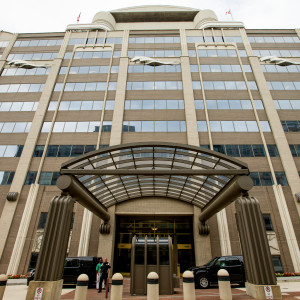February has been a month of change for the Federal Communications Commission, both because of its new Republican leadership and how the new chairman is dramatically changing the way the agency does business.
Recently promoted FCC Chairman Ajit Pai has taken heat from Democrats on what he will or won’t do about the agency’s divisive net neutrality rules, but little has been said about actions he’s already taken to drastically improve transparency at the FCC.
Since taking office the Republican has executed a flurry of process reform changes at the agency. Those changes will make the FCC’s process of creating, modifying, and implementing new rules more open to the public, something lobbyists and lawmakers across the political spectrum criticized in the past.
The first and most important change came down early this month when Pai released the text of two items commissioners will vote on later in February. Releasing the Notice of Proposed Rulemaking and Report and Order will serve as a trial balloon for furnishing all items before votes going forward. That’s a sea change for the FCC, which in the case of net neutrality, didn’t release the wording of the 2015 Open Internet Order — its most significant rules in years — until two weeks after commissioners voted on them.
Pai often decried the standard and wasted no time enacting change.
“An NPRM and a Report and Order are essentially the beginning and the end of a conversation that an administrative agency has with the American public about regulation,” Pai said in a statement announcing the change. “One announces a proposal and asks for public input; the other takes stock of that input and announces a decision.”
“Should things go well, he continued, “my hope is to make it the norm to publicly release, well in advance, the text of all agenda items for monthly commission meetings. And my goal is a simple but powerful one: equal access to the administrative process.”
The chairman quickly followed up with a week’s worth of changes including one used to target him directly in the past. While serving as one of the FCC’s two minority Republican commissioners, Pai often lamented being “left in the dark” on major agenda items by his predecessor Tom Wheeler, who set a modern record for passing rules along 3-2 party line votes.
“During the past few years, the chairman’s office often briefed the press or published a blog about matters to be voted upon at the FCC’s monthly meetings before sharing those matters with commissioners,” Pai said. “As a commissioner, I thought that actions like these were inappropriate and disrespectful of other commissioners.”
Pai said he maintains that view as chairman, and pledged to “share with every commissioner’s office every item that will be considered at an open meeting before anyone in my office discusses the content of those items publicly or the FCC releases the text of those documents.”
One day and two reforms later, Pai enacted two more changes, one each proposed by his fellow Commissioners Michael O’Rielly and Mignon Clyburn, the FCC’s only remaining Democrat. Clyburn suggested releasing a fact sheet with every agenda item to make it more readable to the public. O’Rielly proposed any significant edits to an item between the time it’s released and voted on be proposed by a commissioner.
“This reform will help promote accountability and allow commissioners to better understand where edits are coming from,” Pai said.
The chairman’s office hammered down on editing orders later in the week by limiting the scope of changes that bureaus and offices can make to rules after they’re passed.
Those “editorial privileges” will now be limited to technical items and not what Pai called “substantive edits.”
“Filling in a citation in a document is one thing; changing the meaning of that document is another,” he said. “Any substantive changes made to items following a meeting must be proposed by a commissioner.”
Pai also tackled enforcement action by the FCC on companies for violating agency rules. The agency’s Enforcement Bureau can settle investigations with consent degrees, where a company agrees to abide by certain practices in exchange for closing the investigation. In recent years, those agreements have been made with the signature of the chairman instead of a vote by the full commission.
“Indeed, many times, commissioners were barely given any notice of such consent decrees before they were publicly released by the Bureau,” Pai said. “That process ends now. If commissioners vote to propose and/or impose a forfeiture, the Enforcement Bureau should not settle that matter without their approval.”
Some of those reforms were included in an FCC process reform bill passed unanimously by the House of Representatives last month. Many reforms have been in the crosshairs of Republican lawmakers charged with overseeing the FCC including House Energy and Commerce Committee Chairman Greg Walden and Senate Commerce, Science and Transportation Committee Chairman John Thune.
The general scope of the changes reduce some of the plenary power centralized in the chairman’s office and make the agency’s work more open to the public and other commissioners, regardless of partisan distinction.
Aside from readdressing net neutrality, Pai’s chairmanship isn’t expected to pursue the industry shaking proposals Wheeler aggressively tackled. President Trump reportedly signed off on a plan to move much of the FCC’s consumer protection endeavors to the Federal Trade Commission, while Pai has said his chairmanship will focus on “closing the digital divide” by expanding federal support to rural and underserved broadband deployment, an effort seen largely as non-controversial.
Other moves by Pai, including the closure of an investigation into zero-rating, which his predecessor deemed a violation of net neutrality, and revoking the status of several broadband and wireless providers to supply subsidies to poor Americans, are seen as the opposite. Supporters of zero-rating argue it expands internet use in disadvantaged communities.

